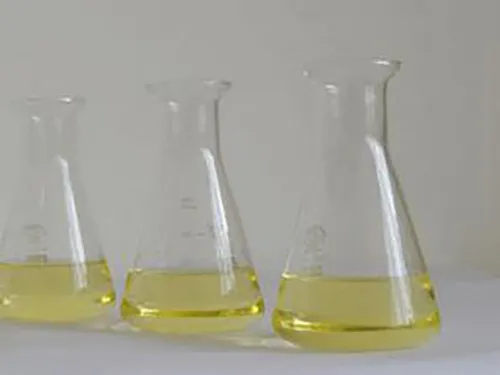Protect Your Systems: The Power of Scale Inhibitors
In industries that rely heavily on water systems—such as manufacturing, energy production, and HVAC—scaling can be a serious issue. The accumulation of mineral deposits on pipes, boilers, and other equipment can reduce efficiency, cause damage, and lead to expensive repairs. That's where scale inhibitors come in. These powerful chemicals prevent the formation of scale, ensuring the longevity and optimal performance of water systems.

Scale Inhibitor: The First Line of Defense Against Scaling
A scale inhibitor is a substance designed to prevent the formation of mineral scale in water systems. Scale buildup occurs when dissolved minerals like calcium and magnesium precipitate out of water and form hard deposits on surfaces. These deposits can clog pipes, reduce heat transfer efficiency, and even damage expensive equipment. By introducing a scale inhibitor into the system, industries can reduce the risk of scaling and avoid costly maintenance.
The effectiveness of scale inhibitors depends on their ability to prevent these minerals from binding together and forming solid crystals. They work by interfering with the crystallization process, allowing the minerals to stay dissolved in the water, thus preventing buildup on surfaces. In the long run, using a scale inhibitor ensures that systems run smoothly without the interference of scale-related problems.
Limescale Inhibitor: Specialized Protection for Hard Water Areas
For regions with hard water, a limescale inhibitor becomes even more critical. Hard water contains high levels of calcium and magnesium, which are the primary culprits behind limescale formation. Limescale inhibitors are designed specifically to target these minerals, preventing them from forming hard deposits on pipes, heat exchangers, and other equipment.
In applications such as water treatment plants, boilers, and cooling towers, where water hardness is a common issue, a limescale inhibitor is essential. The right limescale inhibitor can improve efficiency, lower maintenance costs, and extend the lifespan of the equipment. By reducing the amount of limescale that builds up in pipes and machinery, industries can avoid downtime and increase productivity.
Water Scale Inhibitor: Protecting Your Water Systems from Mineral Buildup
A water scale inhibitor is particularly useful in industries that deal with large volumes of water or operate in environments where water quality is inconsistent. Whether it’s an industrial cooling system or a domestic water heater, water scale inhibitors are formulated to prevent scale formation that would otherwise hinder the system's performance.
For systems exposed to high-pressure water flow or frequent temperature changes, water scale inhibitors can make a significant difference. These inhibitors are designed to handle high levels of calcium and magnesium in the water, keeping the system free from deposits and ensuring smooth operation. Whether it's through chemical additives or physical water treatment systems, water scale inhibitors provide an efficient way to protect equipment from mineral damage.
LK-3100: A Superior Solution for Preventing Scale
One of the most effective scale inhibitors available today is LK-3100. This advanced product is specially formulated to combat limescale and other types of mineral buildup in water systems. LK-3100 works by inhibiting the crystallization of minerals in the water, preventing them from adhering to surfaces and forming harmful scale deposits.
Industries that deal with water treatment, desalination, or even commercial water heating systems can greatly benefit from using LK-3100. Its ability to efficiently prevent scale formation ensures that water systems stay clean and free from deposits, reducing maintenance costs and extending the lifespan of equipment. For companies looking to maximize the performance of their water systems, LK-3100 provides a reliable and powerful solution.
Acrylic Homopolymer: Enhancing Scale Inhibition Performance
In many applications, acrylic homopolymer is used as a key component in scale inhibitors to enhance their performance. This polymer is known for its ability to prevent scale formation while also being environmentally friendly. Acrylic homopolymer works by binding with calcium and magnesium ions, preventing them from forming solid crystals and instead keeping them suspended in the water.
The use of acrylic homopolymer in scale inhibitors allows for a more efficient and sustainable approach to scale control. It ensures that the water remains clear of deposits without introducing harmful chemicals into the system. Whether used in industrial cooling systems or household water filters, acrylic homopolymer helps reduce scale buildup and improve the overall performance of water treatment systems.
By preventing the formation of harmful mineral deposits, these products help maintain efficiency, reduce maintenance costs, and extend the lifespan of equipment. Whether dealing with limescale, general water scale, or high levels of mineral buildup, incorporating a scale inhibitor into your water management strategy is crucial for ensuring the long-term health and performance of your systems.
-
Understanding Polycarboxylic Acids: Properties, Applications, and Future PotentialNewsJul.28,2025
-
Scale Inhibitor Explained: How to Protect Your System from Limescale and Hard Water DamageNewsJul.28,2025
-
Scale and Corrosion Inhibitors: Essential Chemicals for Industrial Water System ProtectionNewsJul.28,2025
-
Polyaspartic Acid: A Biodegradable Polymer for Sustainable ChemistryNewsJul.28,2025
-
Isothiazolinones: A Versatile Antimicrobial Class with Industrial Power and Regulatory ChallengesNewsJul.28,2025
-
A Deep Dive into 2-Phosphonobutane-1,2,4-Tricarboxylic Acid (PBTC)NewsJul.28,2025





